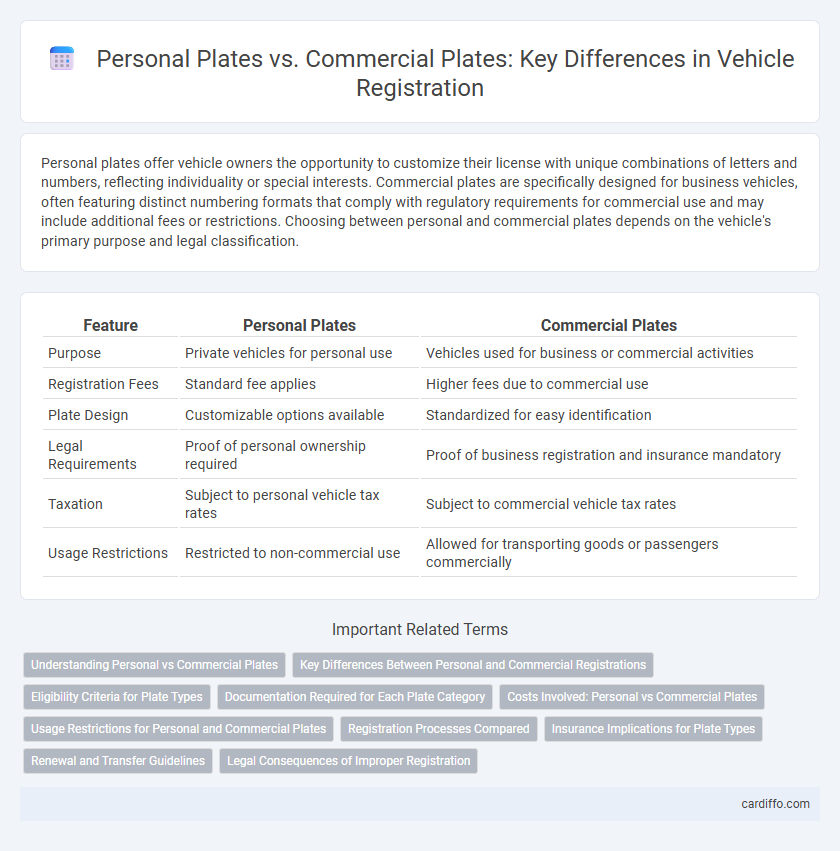Personal plates offer vehicle owners the opportunity to customize their license with unique combinations of letters and numbers, reflecting individuality or special interests. Commercial plates are specifically designed for business vehicles, often featuring distinct numbering formats that comply with regulatory requirements for commercial use and may include additional fees or restrictions. Choosing between personal and commercial plates depends on the vehicle's primary purpose and legal classification.
Table of Comparison
| Feature | Personal Plates | Commercial Plates |
|---|---|---|
| Purpose | Private vehicles for personal use | Vehicles used for business or commercial activities |
| Registration Fees | Standard fee applies | Higher fees due to commercial use |
| Plate Design | Customizable options available | Standardized for easy identification |
| Legal Requirements | Proof of personal ownership required | Proof of business registration and insurance mandatory |
| Taxation | Subject to personal vehicle tax rates | Subject to commercial vehicle tax rates |
| Usage Restrictions | Restricted to non-commercial use | Allowed for transporting goods or passengers commercially |
Understanding Personal vs Commercial Plates
Personal plates are issued for privately owned vehicles and typically feature a unique combination of letters and numbers chosen by the vehicle owner. Commercial plates are designated for vehicles used primarily for business purposes, often subject to different registration fees, weight classifications, and usage regulations. Understanding the distinctions between personal and commercial plates helps ensure compliance with legal requirements and avoids penalties related to vehicle registration and operation.
Key Differences Between Personal and Commercial Registrations
Personal plates are typically assigned to individual vehicle owners and often feature custom or vanity designs, whereas commercial plates are designated for vehicles used primarily for business purposes, including trucks, vans, and company fleets. Commercial registrations frequently require additional documentation, higher fees, and compliance with regulations related to vehicle weight, usage, and insurance coverage. The distinction affects taxation, toll exemptions, and parking privileges, making it essential to select the appropriate plate type based on vehicle function and ownership.
Eligibility Criteria for Plate Types
Eligibility criteria for personal plates typically require vehicle registration under an individual's name, with restrictions on vehicle type and usage primarily for private purposes. Commercial plates demand that the vehicle be registered to a business entity or used predominantly for commercial activities, often mandating specific weight classes, vehicle sizes, or service categories. Verification of proof of business registration, insurance coverage, and adherence to local transportation authority guidelines are essential for qualifying for commercial plates.
Documentation Required for Each Plate Category
Personal plates require a valid proof of identity such as a driver's license or state ID, vehicle ownership documents, and payment of registration fees. Commercial plates necessitate additional documentation including a commercial vehicle registration application, proof of business insurance, and possibly a federal EIN or tax ID number. Both categories typically mandate proof of vehicle inspection and emissions compliance depending on state regulations.
Costs Involved: Personal vs Commercial Plates
Personal plates generally incur lower registration fees compared to commercial plates, reflecting their use on private vehicles primarily for personal transportation. Commercial plates often involve higher costs due to additional regulatory requirements, such as increased insurance premiums and compliance with safety standards for business operations. Businesses should budget for these expenses when registering commercial vehicles, as they directly impact overall operational costs.
Usage Restrictions for Personal and Commercial Plates
Personal plates are typically restricted to private vehicles used for non-commercial purposes, such as personal transportation and leisure. Commercial plates allow vehicles to be used for business activities, including transporting goods or passengers for hire, and often have specific mileage and parking regulations. Usage restrictions for personal plates often prohibit any form of commercial activity, ensuring that only commercial plates are valid for vehicles operating in a business capacity.
Registration Processes Compared
Personal plate registration typically involves providing proof of identity, residency, and vehicle ownership, with fewer regulatory requirements and a faster approval process. Commercial plate registration demands additional documentation like business licenses, DOT numbers, and compliance with weight and usage regulations, often resulting in longer processing times. The differing registration processes reflect the distinct legal and operational standards governing personal versus commercial vehicle use.
Insurance Implications for Plate Types
Personal plates typically carry lower insurance premiums due to lower associated risk profiles compared to commercial plates, which often face higher rates reflecting increased liability and heavier usage. Insurance providers evaluate commercial plates under stricter criteria, considering factors like vehicle load capacity, frequency of use, and purpose-driven exposure to accidents. Policyholders with commercial plates must ensure coverage aligns with operational risks, while personal plate owners benefit from more affordable liability coverage options.
Renewal and Transfer Guidelines
Personal plates renew annually with fees based on plate design and vehicle type, while commercial plates may require additional endorsements and higher fees due to usage regulations. Transfers of personal plates typically allow owners to move plates between vehicles under the same name, whereas commercial plate transfers often involve stricter documentation to ensure compliance with commercial vehicle standards. Renewal deadlines for both must be observed to avoid late penalties, but commercial plates usually necessitate more frequent inspections and proof of ongoing commercial use.
Legal Consequences of Improper Registration
Improper registration of personal plates as commercial plates or vice versa can lead to severe legal consequences, including fines, vehicle impoundment, and possible suspension of driving privileges. Authorities strictly enforce distinctions between personal and commercial vehicle registrations due to regulatory, tax, and insurance requirements tied to each category. Failure to comply with proper registration protocols may also result in increased scrutiny during inspections and potential liability issues in accidents.
Personal Plates vs Commercial Plates Infographic

 cardiffo.com
cardiffo.com